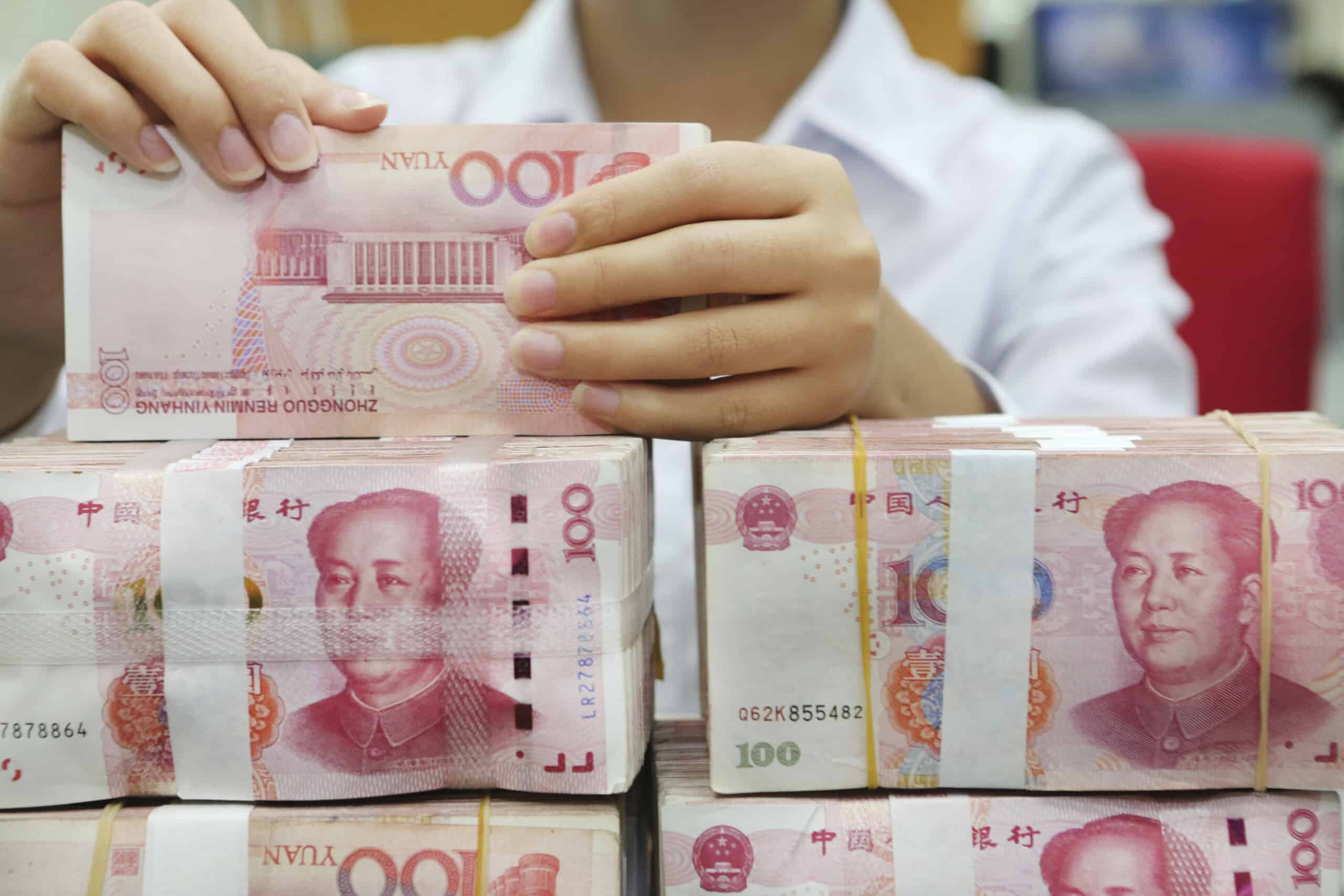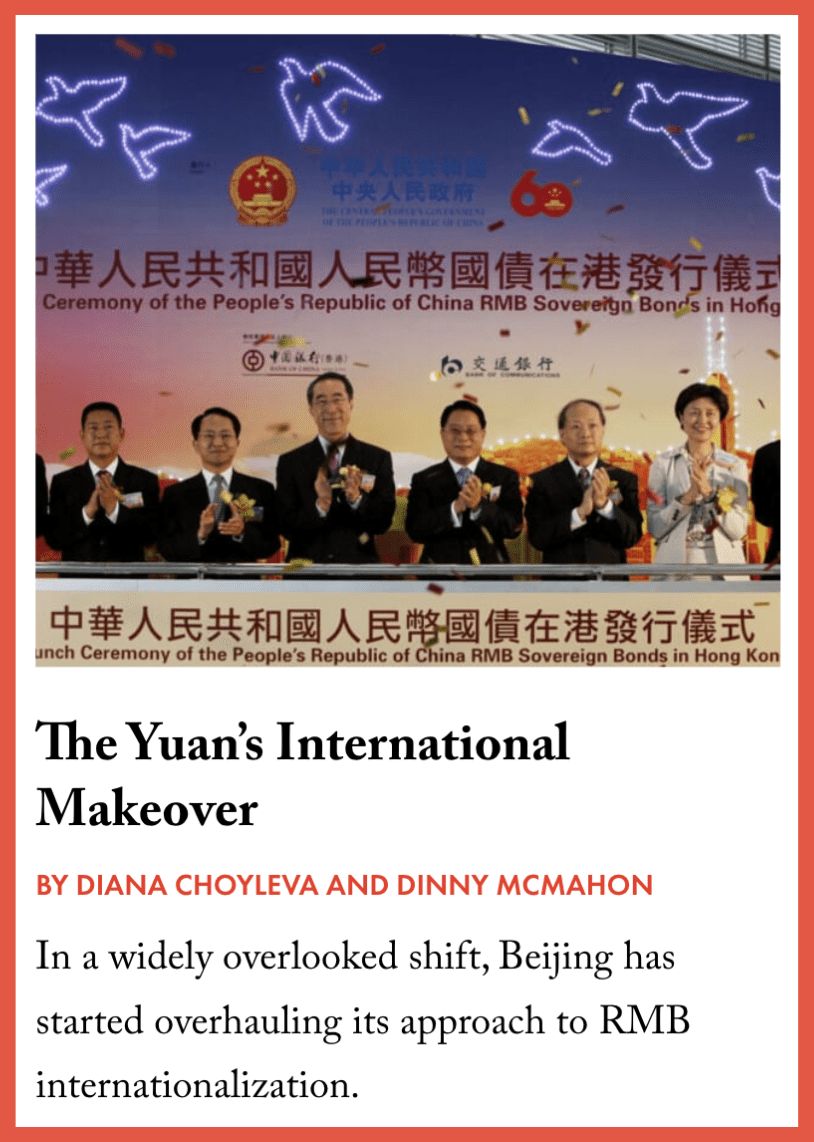GRADY MCGREGOR

A clerk counts renminbi banknotes at a branch of Bank of China in Nantong, Jiangsu province, July 23, 2018. Credit: Imaginechina via AP Images
The opening of the Rooppur nuclear power plant in eastern Bangladesh next year will provide the largest boost to the country’s energy production capabilities in decades. But it will carry another distinction relevant to international finance — it will have been paid for, in large part, with renminbi, even though China has barely been involved in its construction.
Using China’s currency has helped solve a long stalemate between the government in Dhaka and Russia, which initially agreed to finance the $12.7 billion project in 2016. Following Russia’s invasion of Ukraine last year, the U.S. effectively shut it off from the dollar-dominated global financial system, making it nearly impossible for Bangladesh to make loan-related payments in greenbacks; Bangladeshi officials, meanwhile, refused to settle the transaction in Russian rubles.
 The Rooppur nuclear power plant currently under construction in Rooppur, Bangladesh, June 29, 2022. Credit: Energy & Power
The Rooppur nuclear power plant currently under construction in Rooppur, Bangladesh, June 29, 2022. Credit: Energy & PowerThis week, however, Russia agreed to let Bangladesh make an interim loan repayment worth $318 million in renminbi — the most attractive option left to both sides.
“Russia did not necessarily want to accept renminbi, but it was convenient because nothing else was available,” says Alicia Garcia-Herrero, chief economist for the Asia Pacific at investment bank Natixis.
Despite a years-long effort from Beijing to promote so-called ‘renminbi internationalization’, its use in settling cross-border transactions is still rare, especially when a Chinese company or government organ isn’t involved. The renminbi accounts for only 2.3 percent of global currency payments, far behind the U.S. dollar’s 42 percent share, according to the latest data from the SWIFT RMB Tracker.
But even if the renminbi is unlikely to supplant the dollar any time soon, the Chinese authorities are still interested in chipping away at its lead — particularly if it can help provide a buffer against the threat of American sanctions, both for China and its allies like Russia. Every nuclear power plant or similar project paid for with Chinese currency is one that’s out of the U.S. government’s reach, after all.
When the U.S. economy had a financial crisis, China ended up getting hurt. China figured, we should probably promote our own currency now.Daniel McDowell, associate professor of political science at Syracuse University
“Beijing is trying to get away from the ‘weaponized dollar’ in increasing renminbi use globally. Their primary goal is to reduce their exposure to sanctions,” says Gerard DiPippo, senior fellow in economics at the Center for Strategic and International Studies. “Beijing has no illusion about being able to replace the dollar worldwide. They just want the dollar stranglehold on them to be mitigated.”
The Chinese government’s efforts to reduce its dollar dependence aren’t new. Policy makers at the People’s Bank of China, the country’s central bank, began exploring the strategy in the 2000s, intensifying their efforts after the 2008 global financial crisis.
“China had economic motives to de-dollarize that predate sanction concerns,” says Daniel McDowell, associate professor of political science at Syracuse University. “When the U.S. economy had a financial crisis, China ended up getting hurt. China figured, we should probably promote our own currency now.”
Beijing’s failure to liberalize its economy have long stymied its efforts to promote the renminbi abroad, in particular its resistance to allowing it to be traded like any other major currency.
“The problem with the renminbi is liquidity. The liquidity is constrained by capital controls imposed by the Chinese monetary authorities,” says Paola Subacchi, an economics professor at Queen Mary University of London.
Defensiveness has instead become a key motivation for China to push for greater renminbi usage. The U.S.’s sanctions against Russia in 2014, in response to Moscow’s annexation of Crimea, alarmed Beijing, alerting policy makers to the possibility that China could one day become a similar target. It opened the Cross-Border Interbank Payment System (CIPS) the following year, a clearinghouse for renminbi transactions similar to SWIFT, the messaging system between banks that underpins the vast majority of global financial transactions.
“CIPS was created to facilitate better, more efficient settlement of the renminbi. It is still far, far away from being an institution that has significant influence in the international financial system” says Emily Jin, a researcher at the Center for a New American Security, the Washington think tank. “But it’s fair to think that elite policymakers inside of China have U.S. sanction power in the back of their heads when they’re refining its capabilities.”
Countries realize the global public good of the U.S. dollar but also that the currency has been weaponized.Gregory Chin, political science professor at York University
The U.S., meanwhile, has expanded its use of sanctions as a means to punish Chinese companies and officials in recent years, motivating Beijing to employ its diplomatic clout.
“Since last year, China has become more forward in their statements in pushing others to use the renminbi for international transactions,” says Gregory T. Chin, a professor of political science at York University in Toronto.
A CGTN video covering Argentina’s recent agreement to pay for imports in renminbi, April 28, 2023. Credit: CGTN
Beijing appears to have registered some success: in March, it conducted more bilateral trade in renminbi than the dollar during the month for the first time. Over 30 countries, including Brazil, Argentina, Indonesia and Russia have announced that they would replace the dollar with the renminbi in bilateral transactions with China. Saudi Arabia, meanwhile, has also signaled openness to settling its valuable oil exports to China in renminbi.
“Every night I ask myself why all countries have to base their trade on the dollar,“ Brazilian President Luiz Inacio Lula da Silva said during a speech on his recent trip to China. “Who was it that decided that the dollar was the currency after the disappearance of the gold standard?”
Some third-party countries, like Brazil, might opt to trade in renminbi as a means to cozy up to Beijing. But some, at least, may view using the Chinese currency as an economic hedge to protect against the increasing use of U.S. sanctions.
“Countries realize the global public good of the U.S. dollar but also that the currency has been weaponized,” says Chin, from York University. “They may calculate that today it’s Russia, but tomorrow it could be you [targeted by sanctions].”
Sanctions are often done for symbolic reasons to signify that the U.S. is ‘doing something’ even though we know it’s not actually going to change the behavior of the target.Gerard DiPippo, senior fellow in economics at the Center for Strategic and International Studies
In response to the increasing global acceptance of the renminbi, U.S. policy makers could practice more restraint when deploying sanctions power, some experts say.
“Sanctions are often done for symbolic reasons to signify that the U.S. is ‘doing something’ even though we know it’s not actually going to change the behavior of the target,” says DiPippo, who points to actions such as those put in place against Hong Kong’s former chief executive Carrie Lam in 2020.
“I agree that the sanctions were morally correct. But did we actually think it was going to change China’s behavior? No way. We did it anyway,” he says. “If you keep doing that kind of stuff, at the margins, it pushes other countries away from the dollar.”

No comments:
Post a Comment